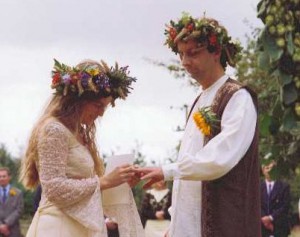The British press is full of the debate about gay marriage at the moment. The religious right is horrified at the prospect that it could be made legal, whilst David Cameron has become an unexpected champion of the cause. I come at the question from a slightly different angle.
For years when people asked me when I would marry my stock answer was to quote Emma Goldman, the early 20th century anarchist and revolutionary
Love, the strongest and deepest element in all life, the harbinger of hope, of joy, of ecstasy; love, the defier of all laws, of all conventions; love, the freest, the most powerful moulder of human destiny; how can such an all-compelling force be synonymous with that poor little State and Church-begotten weed, marriage?
Marriage I saw as an institution of State and Church. If there is love I argued, what need is there for marriage?
Then one day I changed my mind. I realised that I wanted to get married. I’d found the woman I wanted to stay with and I wanted her to know that. But that desire had nothing to do with seeking the approval of Church or State for my love. What it had to do with was my partner and I.
 Marriage to me meant making a clear commitment to my partner. It meant saying to her I love you, and I know sometimes it will be hard, but I know you’re worth it and I promise to work through things when they get tough. It meant telling the world about our love; making that commitment witnessed by those who are important in our lives. At our wedding we gathered together all of our friends and family to help us celebrate. But we didn’t invite the State. What’s it got to do with them?
Marriage to me meant making a clear commitment to my partner. It meant saying to her I love you, and I know sometimes it will be hard, but I know you’re worth it and I promise to work through things when they get tough. It meant telling the world about our love; making that commitment witnessed by those who are important in our lives. At our wedding we gathered together all of our friends and family to help us celebrate. But we didn’t invite the State. What’s it got to do with them?
Of course, like it or not, the State has a lot of power over our lives. Having your marriage recognised by the state has its benefits—inheritance, tax, pensions, perhaps residency. Pragmatically we did the minimum we could get away with to get those benefits, and popped down to the registry office with a couple of witnesses a few days before our real wedding. Dressed in our normal scruffy clothes, with no ring and turning down the offer of a reading, I don’t think the registrar thought we were taking it very seriously. Which was about right. We weren’t. We sought the State’s approval of our marriage grudgingly. We were there for little other reason than to clarify who gets what when one of us dies. Having to make the extra effort to do that was an irritation. It was a practical business deal, and if the option of civil partnership had been available to us then we would probably have preferred that.
What really mattered came later. In a very personal ceremony in an orchard in Herefordshire we declared our love to each other, made our commitments and celebrated with those who matter—our family and our friends. That was our wedding. The nurturing, loving relationship which has held each of us through the ensuing decade and through some difficult times is our marriage. And neither Church nor State has any part in that.
Irrespective of the sexuality of the partners, there is no place for the State in marriage. Marriage is between those who marry. The State should concern itself only with the practicalities, which it should do even handedly without any regard for sexuality. Whether gay or straight, the state should abandon any pretence at having a role in marriage and leave marriage to those who are in love.
